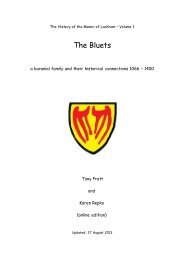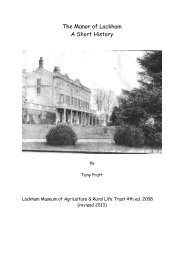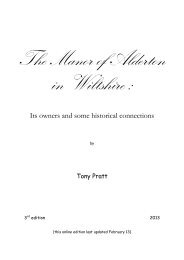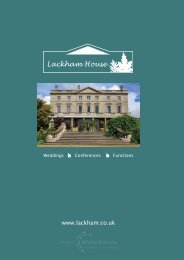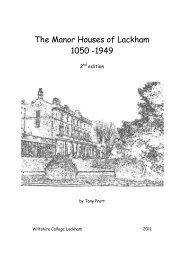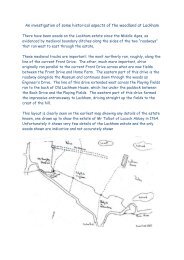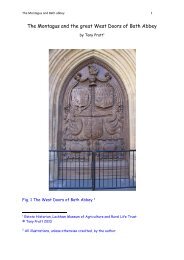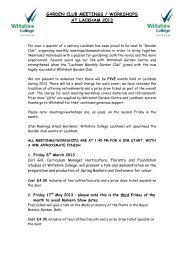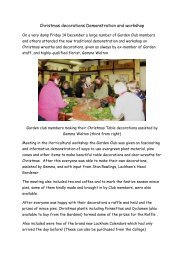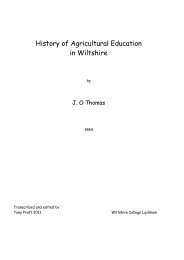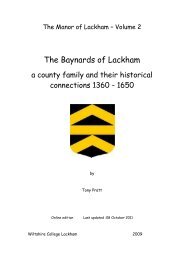Vol 3 - Lackham Countryside Centre
Vol 3 - Lackham Countryside Centre
Vol 3 - Lackham Countryside Centre
You also want an ePaper? Increase the reach of your titles
YUMPU automatically turns print PDFs into web optimized ePapers that Google loves.
The Manor of <strong>Lackham</strong> <strong>Vol</strong> 3 : The Montagu family<br />
the gentry all repair to me upon all occasions of unlawful<br />
meetings, although I am neither a deputy-lieutenant nor a<br />
Justice of the peace I have been informed by John Eyre of<br />
Little Chalfield, Henry Long a Captain of Foot in Wiltshire<br />
and Mr Cornelius, each of whom are very active in suppressing<br />
Conventicles, that the Quakers who were fined by Jas<br />
Montague and George Johnson still despite all authority and<br />
say they will meet; also that there have been great meetings<br />
of Anabaptists and Presbyterians of which Mr Eyre will give<br />
lord Arlington an account after he has met Sir Edward<br />
Hungerford at sessions what we desire is that a troop of lord<br />
Oxford's Regiment may be sent and quartered in Wilts so as<br />
to curb these insolent people; otherwise they will so increase<br />
that it will be impossible to bring them to obedience 238<br />
The Conventicle Act of 1664 was an Act of parliament that forbade<br />
religious assemblies of more than five people outside the control of the<br />
Church of England. This law was Clarendon’s program to discourage<br />
nonconformity and strengthen the position of the Established Church.<br />
These prohibitions led many priests to leave their parishes rather than<br />
submit to the new church authorities. Many congregations followed their<br />
ministers out of the established church, meeting on hillsides etc. From<br />
small beginnings these field assemblies - or conventicles - were to grow<br />
into the major problems of public order that Talbot feared in his letter.<br />
"An Act to prevent and suppress Seditious Conventicles." The Act imposed<br />
a fine on any person who attended any religious assembly (conventicle),<br />
other than those of the Church of England, of five shillings for the first<br />
offence and ten shillings for a second offence and it is these Acts which<br />
the local JP’s, including James II, are enforcing with fines. Talbot was<br />
.<br />
was the second President of the Royal Society, but his main interests, were antiquarian<br />
rather than scientific. Taking advantage of the many opportunities of making money<br />
which his official position gave him, he became very rich.<br />
238 Green, MAE (ed) (1895) Calendar of State Papers Domestic : Series James I<br />
1619-1623 p384 Letter dated August 20 th 1670<br />
60



